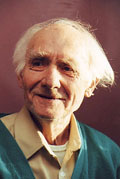Pent Nurmekund
 With the concert marking the beginning of the oriental new year we would like to commemorate and honour Pent Nurmekund, a remarkable figure in Estonian culture whose birth centenniary was recently celebrated. He initiated the study of Asian languages and cultures in Estonia and was one of the most prominent Estonian polyglots of all times, able to translate from dozens of foreign languages (being also knowledgeable in the dialects of several of these) and also to communicate in many of these. He was a founding member of the Estonian Oriental Society that was established in 1935. In 1955 he started teaching Chinese at the University of Tartu, which gave an impetus to open the Oriental Studies division at the university where he would go on teaching Asian and African languages for the following 28 years. However, the younger generations may less than well be aware of Pent Nurmekund's contribution to Asian studies in Estonia which is still waiting for the full recognition it deserves.
With the concert marking the beginning of the oriental new year we would like to commemorate and honour Pent Nurmekund, a remarkable figure in Estonian culture whose birth centenniary was recently celebrated. He initiated the study of Asian languages and cultures in Estonia and was one of the most prominent Estonian polyglots of all times, able to translate from dozens of foreign languages (being also knowledgeable in the dialects of several of these) and also to communicate in many of these. He was a founding member of the Estonian Oriental Society that was established in 1935. In 1955 he started teaching Chinese at the University of Tartu, which gave an impetus to open the Oriental Studies division at the university where he would go on teaching Asian and African languages for the following 28 years. However, the younger generations may less than well be aware of Pent Nurmekund's contribution to Asian studies in Estonia which is still waiting for the full recognition it deserves. Knowing and studying faraway and lesser-known cultures is more topical than ever due to the ready availability of information today. Which of these are worth studying and to what extent, what to adopt from them or how to integrate them is certainly up to each of us to decide on our own. The doors are open and it only takes an interest, a wish to learn, an understanding. This, however, may turn out to be only seemingly simple in the contemporary world, which, as we well know, is full of conflicts and misunderstandings between cultures and religions.
Language is an important key to other cultures and to understanding different world views. Bearing this in mind, our attention is drawn to the fact that the man who knew so many languages and dialects from all continents wrote the verses in his only collection of poetry titled Kõllanõmme in his home dialect from the border of the Mulgimaa region. The ability to understand and value his roots in this multifaceted and varied world even if one has such a wealth of knowledge and experience to choose from demonstrates a person's greatness and wisdom. Such people know the centre and the foundation around which and upon which they can build a world within and around themselves. Pent Nurmekund's timeless relation to the world of sounds has found a vivid illustration in a comparison he has made that can seem fairly unexpected to many people who are used to "ordinary" music, be it classical or popular: "The really beautiful music is when the wind is singing in the chimney flap!"
This concert brings together into one whole medieval European music and the earliest instrumental music written down outside Europe for the seven-stringed Chinese zither gu qin. Old manuscripts give us a wonderful opportunity to compare the soundscapes of China and Europe from centuries ago - these may have been an immediate language between people in the past and also prove to be that today if only we take the trouble of paying attention and really listening?



